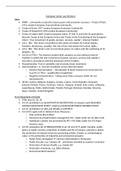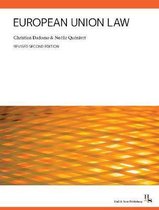European Union Law Revision
Intro
WWII – community created to ensure peace and economic recovery = Treaty of Paris
1951 creates European Coal and Steal Community
Treaty of Rome 1957 creates European Economic Community
Treaty of Maastricht 1992 creates European Community
Treaty of Lisbon 2007 creates European Union ToR 57 and ToM 92 amended to
become Treaty of the European Union and Treaty of the Functioning of the European
Union = free movement of goods, persons, services, capital = Internal Market
Art 2, TEU: ‘The Union is founded on the values of respect for human dignity,
freedom, democracy, equality, the rule of law and respect for human rights…’
Art 3, TEU: ‘The Union’s aim is to promote peace, its values and the well-being of its
peoples.’ Etc.
Art 26 (2) TFEU: ‘The internal market shall comprise an area without internal
frontiers in which the free movement of goods, persons, services and capital is
ensured in accordance with the provisions of the Treaties.’
Proportionality: Test of suitability and necessity (least restrictive)
Harmonisation, i.e. common standards across internal market
o Positive Harmonisation – introduction of State measures to harmonise EU
(e.g Art 53 TFEU – qualification recognition)
o Negative Harmonisation – taking away State measures which do not
harmonise EU
28 MS: Austria, Belgium, Bulgaria, Croatia, Cyprus, Czech Republic, Denmark,
Estonia, Finland, France, Germany, Greece, Hungary, Ireland, Italy, Latvia, Lithuania,
Luxembourg, Malta, Netherlands, Poland, Portugal, Romania, Slovakia, Slovenia,
Spain, Sweden, United Kingdom
Free Movement of Goods
TFEU Arts 34, 35, 36
Art 34: prohibition on QUANTITATIVE RESTRICTIONS on imports and MEASURES
HAVING EQUIVALENT EFFECT, shall be prohibited BETWEEN MEMBER STATES
Art 35: prohibition on QRs and MEQRs on EXPORTS
Art 34/35 apply only to National State Measures:
o Only vertical direct effect
o Measures by private bodies managed by MS = liable under Art 34 (Buy Irish)
o Individual’s actions not prevented by MS = MS liable under Art 34 (Angry
Farmers case)
Art 36: exhaustive list of DEROGATIONS to art 34 and 35 public morality, public
policy or public security; protection of health and life of humans, animals or plants;
the protection of national treasures possessing artistic, historic or archaeological
value; or the protection of industrial and commercial property
o Public Policy derogation Narrow interpretation (Thompson)
o Public Security, e.g. Campus Oil – petroleum essential to country’s economy
o Protection of Human Health, e.g. Sandoz BV
o Protection of Animals, e.g. Ditlev Bluhme
o Environmental Protection?





